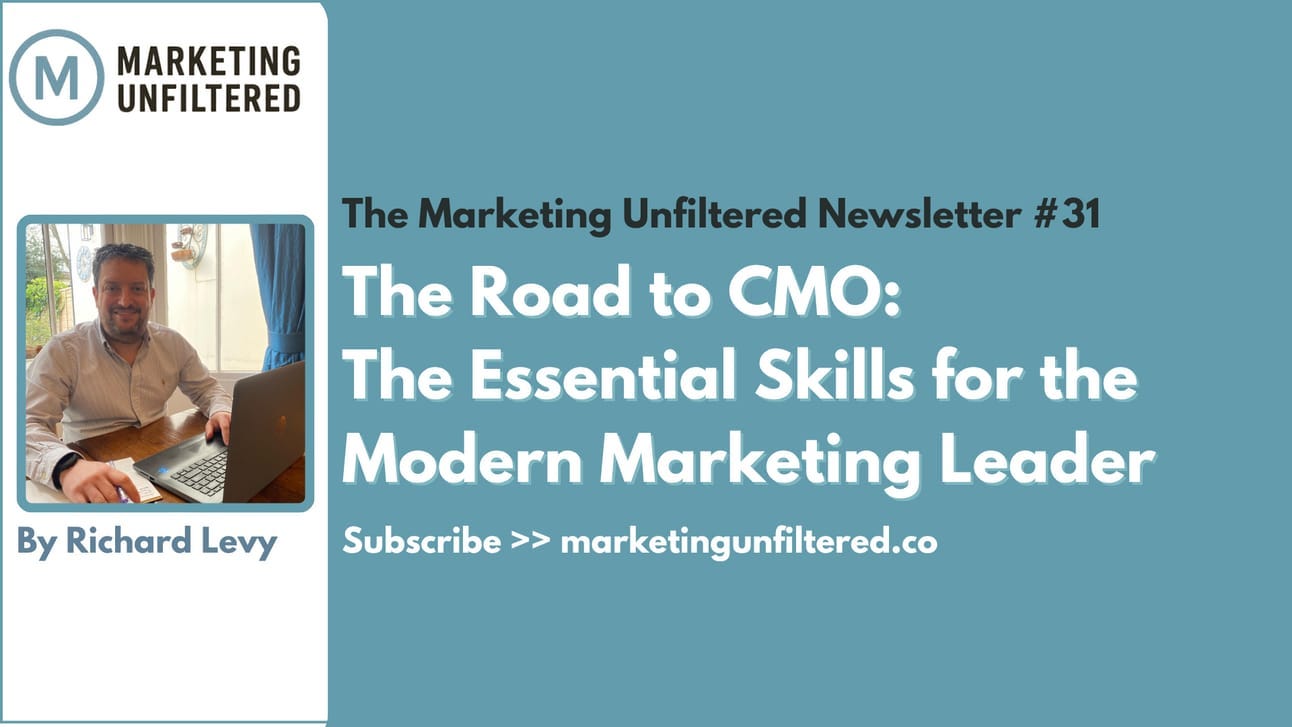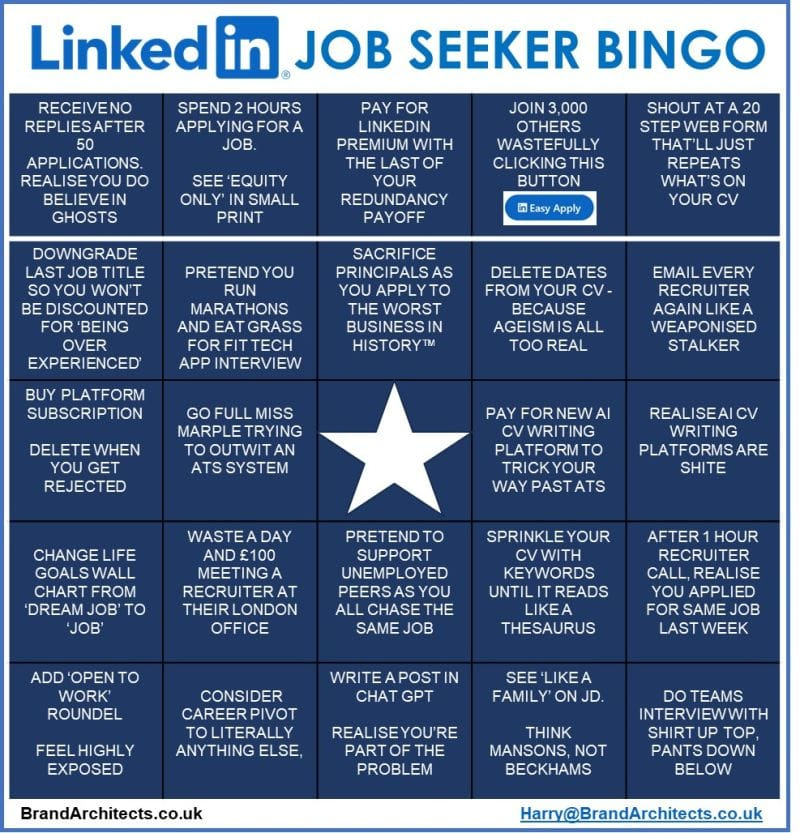The Road to CMO: Essential Skills for the Modern Marketing Leader
Marketing Unfiltered #31 - Guide To Becoming The Modern Day CMO
📝 Editor Note 📝
Hello and welcome back to this week’s Marketing Unfiltered
We have a guide to becoming the modern-day CMO, the steps you must take to get there, and the skills you need to (re)build.
Thanks for your kind words last week on the long-form piece on how to market content more effectively. Remember, if you missed any, you can catch up below:
Read: The current state of the CMO role - Watch On YouTube
Read: The future of SEO and why SEO is far from dead - Watch On YouTube
Read: How Marketing leaders are allowing bland content to negatively impact their own business - Watch On YouTube
» Got any feedback for us? Let us know or hitting reply

The Road to CMO: Essential Skills for the Modern Marketing Leader
In today's rapidly evolving business landscape, the role of Chief Marketing Officer has transformed dramatically. No longer simply the keeper of the brand or the head of advertising, today's CMO sits at the intersection of technology, data, customer experience, and business strategy. As someone who has navigated this landscape for over fifteen years, I've witnessed firsthand how the requisite skills have shifted. The journey to the CMO's office requires a unique blend of capabilities that extend far beyond traditional marketing expertise.
The Evolution of the Marketing Leader
When I began my marketing career in the early 2000s, digital marketing was still in its infancy. Social media was barely a concept, and the idea that marketers would need to understand complex data analytics seemed far-fetched. Fast forward to 2025, and the marketing function has undergone a seismic shift. Today's marketing leaders must possess a rare combination of creativity and analytical thinking, strategic vision and tactical execution, technological savvy and human intuition.
I clearly remember sitting in a boardroom in 2012, presenting our quarterly marketing results to the executive team. I had prepared a comprehensive report on our campaign metrics such as impressions, click-through rates, and conversion percentages. When the CFO asked about the impact on customer lifetime value and return on marketing investment, I realised I had only half the story. That moment changed my career trajectory, pushing me to develop a much broader skill set that would eventually help me reach the C-suite.
The Essential Skills for CMO Success
1. Strategic Business Acumen
Perhaps the most crucial skill for aspiring CMOs is the ability to think like a business leader, not just a marketing specialist. Today's CMOs are expected to contribute to overall business strategy and demonstrate how marketing drives business outcomes.
Modern CMOs must:
Understand the company's business model
Speak the language of finance fluently
Connect marketing activities directly to revenue generation
Participate in strategic planning beyond the marketing function
Anticipate market trends and position the company accordingly
I learned this lesson the hard way when pitching for a substantial budget increase early in my career. I presented a compelling creative strategy but failed to articulate the business case effectively. A mentor later advised me to reframe my proposal in terms of expected ROI, market share growth, and competitive positioning. When I returned with this business-focused approach, the budget was approved within a week
2. Data Fluency and Analytics Mastery
The modern CMO must be comfortable swimming in oceans of data. This doesn't mean you need to be a data scientist, but you do need to know which questions to ask of your data and how to translate insights into action.
Critical capabilities include:
Understanding key performance metrics across marketing channels
Using data to inform strategy rather than just report outcomes
Building data-driven decision-making processes
Balancing quantitative analysis with qualitative insights
Implementing proper attribution models to understand marketing effectiveness
One of my career breakthroughs came when I partnered with a third party to build an attribution model that finally demonstrated how our content marketing efforts were influencing purchasing decisions, even when they weren't the last touchpoint. This helped secure executive buy-in for a content strategy that had previously been underfunded, ultimately delivering a 35% increase in qualified leads.
3. Customer-Centricity and Experience Design
The most successful marketing leaders place the customer at the centre of everything they do. This means going beyond surface-level demographic understanding to develop deep empathy for customer needs, challenges, and aspirations.
Aspiring CMOs should excel at:
Developing detailed customer personas based on research
Mapping comprehensive customer journeys across touchpoints
Understanding emotional as well as functional needs
Designing seamless experiences across channels
Using the voice of customer data to drive decisions
I remember instituting a monthly "customer immersion day" where our entire marketing team would listen to customer service calls, read support tickets, and review customer feedback. This practice transformed our marketing approach, making it noticeably more relevant and effective. Within six months, our customer satisfaction scores had improved by over 5%.
4. Technological Literacy
While CMOs don't need to code or configure complex systems, they do need to understand the marketing technology landscape and make informed decisions about the tools that will drive marketing success.
Key technological competencies include:
Understanding the core functions of a modern marketing tech stack
Evaluating marketing automation platforms and CRM systems
Appreciating the capabilities and limitations of AI in marketing
Making informed build-vs-buy decisions for marketing technology
Collaborating effectively with IT and data teams
When I joined a mid-sized fintech firm, I discovered a sprawling, disconnected marketing technology ecosystem with significant duplication. By developing a clear understanding of our actual needs and the available solutions, I was able to consolidate the tech stack from 37 tools to 14, saving nearly £200,000 annually while maintaining the capabilities.
5. Cross-Functional Leadership
Modern CMOs rarely have the luxury of operating within a marketing silo. Success depends on your ability to collaborate with and influence stakeholders across the organisation, from sales and product to finance and technology.
Essential cross-functional leadership skills include:
Communicating marketing's value to non-marketing colleagues
Building strong partnerships with sales leadership
Working effectively with product teams on customer-focused innovation
Collaborating with finance on budgeting and ROI assessment
Partnering with technology teams on digital transformation initiatives
One of my proudest achievements was establishing a revenue operations function that brought together marketing, sales, and customer success under a unified strategy. Breaking down these silos improved our ability to deliver consistent experiences throughout the customer lifecycle and significantly improved our retention metrics.
6. Adaptability and Continuous Learning
The pace of change in marketing is relentless. New channels emerge, consumer behaviours shift, and technologies evolve seemingly overnight. Successful marketing leaders cultivate a growth mindset and commit to continuous learning.
This includes:
Staying current with emerging trends and technologies
Building networks of knowledgeable peers and mentors
Experimenting with new approaches and learning from failures
Encouraging innovation within marketing teams
Balancing established best practices with emerging approaches
I've made it a personal rule to dedicate at least half a day each week to professional development, whether that’s reading industry publications, attending webinars, or participating in peer groups. This habit has repeatedly helped me identify opportunities before competitors and avoid costly investments in fading channels or technologies.
7. Storytelling and Communication Excellence
Despite the increasing emphasis on data and technology, marketing remains fundamentally about communication. The ability to craft compelling narratives and communicate effectively across various audiences and channels remains crucial.
Aspiring CMOs should master:
Developing brand narratives that resonate emotionally
Communicating complex ideas in simple language
Adapting messaging for different stakeholders and contexts
Visual as well as verbal communication
Persuasive presentation skills for the boardroom
Early in my career, I worked alongside a brilliant strategist who struggled to gain traction for her ideas because she couldn't communicate them effectively to our executive team. I learned from watching her challenges and dedicated myself to becoming not just a good marketer but an exceptional communicator.
8. Financial Management And Budgeting
Marketing leaders who aspire to the CMO role must demonstrate fiscal responsibility and sophisticated budget management. This means not just spending wisely but strategically aligning resources with objectives.
Key financial skills include:
Developing and managing complex budgets
Allocating resources based on performance data
Building business cases for marketing investments
Understanding financial modelling and forecasting
Navigating procurement and vendor management
Making hard choices
When I inherited a marketing department with declining effectiveness despite increased spending, I implemented zero-based budgeting, requiring every expenditure to be justified based on expected outcomes rather than historical precedent. This approach initially created friction but ultimately improved our marketing ROI by 8% in the first year.
Charting Your Path to CMO
The journey to becoming a CMO is rarely linear. For most marketing professionals, it requires deliberate skill building across multiple domains and the willingness to step outside comfort zones.
Consider these approaches for developing your CMO-ready skill set:
Seek Cross-Functional Experiences
Look for opportunities to work across different marketing disciplines and adjacent functions. A stint in digital marketing, brand management, product marketing, or customer experience can broaden your perspective and skill set. Similarly, roles that require close collaboration with sales, product, or technology teams can help you develop the cross-functional fluency that CMOs need.
Develop Business and Financial Acumen
Take advantage of formal and informal opportunities to strengthen your business knowledge. This might include pursuing an MBA, taking finance courses, or simply spending more time with colleagues from finance and strategy. Understanding how your business makes money, and how marketing contributes to financial outcomes, is essential for C-suite credibility.
Build Your Technology Capabilities
While you don't need to become a technologist, understanding marketing technology architecture and capabilities is increasingly important. Consider certifications in marketing platforms, attend technology conferences, and build relationships with IT colleagues who can help deepen your understanding.
Cultivate Your Executive Presence
CMOs must command respect in the boardroom and inspire teams across the organisation. Work on your presentation skills, executive communication, and ability to translate marketing concepts for non-marketing audiences. Finding mentors who exemplify strong leadership can accelerate this development.
Practice Data-Driven Decision Making
Look for opportunities to strengthen your analytical capabilities. This might mean taking courses in data analysis, working closely with analytics teams, or simply challenging yourself to base more decisions on data rather than intuition alone.
The Future CMO: What's Next?
As we look toward the future, the CMO role continues to evolve. Emerging trends suggest that tomorrow's marketing leaders will need to develop capabilities in:
AI strategy and implementation across the marketing function
Privacy-first marketing in an increasingly regulated environment
Purpose driven brand building in a socially conscious marketplace
Real-time personalisation at scale
Sustainability marketing and circular economy principles
Those who aspire to marketing leadership would do well to monitor these trends while building the foundational skills outlined above.
Conclusion: A Journey Worth Taking
The path to becoming a CMO has never been more challenging, or more rewarding. Today's marketing leaders have unprecedented opportunities to drive business strategy, shape customer experience, and create lasting value. While the skill requirements are demanding, each capability you develop makes you not just a better marketing leader but a more complete business executive.
My own journey to marketing leadership has been filled with moments of challenge, growth, and flexibility. The landscape will continue to evolve, but one thing remains constant: successful CMOs combine deep marketing expertise with broad business acumen, technological understanding, and exceptional leadership skills. By developing these capabilities, you position yourself not just for the CMO role but for lasting impact in an increasingly complex business environment.
By Richard Levy, CEO and Founder of Sophera Marketing
Connect With Richard On LinkedIn
>> If you enjoyed this, you will love Harry being pushed by me on the CMO title and role

» Harry’s delivers another brilliant bingo card
How To Get The Most Out Of Your Content Marketing


Is Your Content Invisible? Time to Break the Bland Barrier With Chris Hutchings
A reminder of why this chat with Chris was so important:
We explore common missteps brands and brand leaders make, we break the myth that there’s no organic reach, and why your brand guidelines stifle creativity.
We highlight the need for personal connection, community building, and innovative approaches to customer relationship management - remember speak with, not speak at!
We advocate for a shift in marketing strategies to embrace change and foster creativity within brand frameworks not say no as default.
We explored the evolving landscape of Marketing, emphasising the importance of understanding customer needs, the role of AI in content,
We break down the need for UGC, the value of ECG (user-employee-generated content), and IGC (influencer-generated content).
We discuss the necessity of quality over quantity in content, and the significance of effective distribution strategies (not just create content spray and pray across all channels. The dialogue culminates in actionable marketing tips and insights into why brand content often fails to resonate with audiences.
Have a great weekend and we will land in your inbox with a some great and punchy takes on CMOs vs other C-Suite equivalent titles from Marketing Unfiltered readers
Thanks,
Danny Denhard - get in touch with feedback on Marketing Unfiltered

